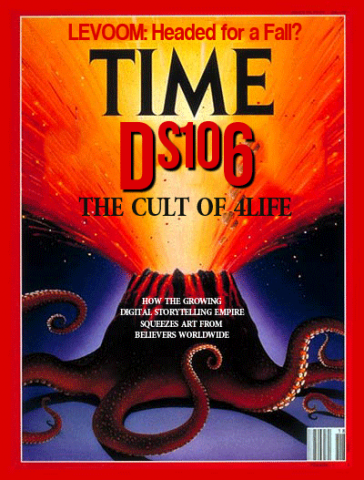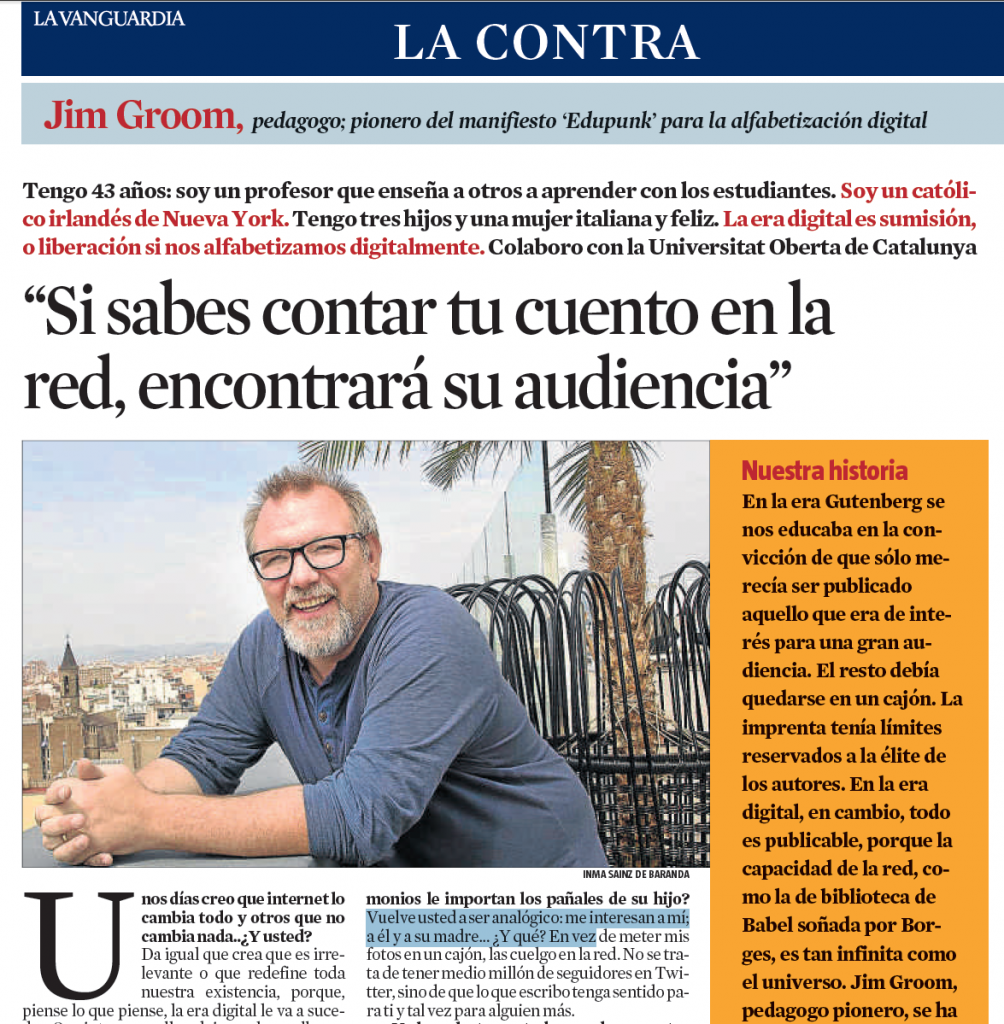This just in from the “I love Me” department.
Last month I spent five days in beautiful Barcelona presenting at the Annual EDEN Conference and watching 2001: A Space Odyssey in glorious 70MM at the phenomenal Phenomena theater. It was a blast, and an excellent European primer for my family’s fast approaching move to Italy. While there I was interviewed by Lluís Amiguet of La Vanguard about a range of topics from blogging to networks to online communities to EDUPUNK to digital higher ed. Now I would love to talk in some depth about the article/interview, but I can’t get my hands on a decent translation, and my Spanish is non-existent. So, if anyone out there is interested in a free domain and web hosting for the foreseeable future in exchange for a translation, let me know—Reclaim Hosting has got you covered 🙂 Hell, you might even be able to find the article in Spanish by clicking the link below.
I have to say it doesn’t suck to see an article like this where your work/ideas are featured.* That said, it’s important to recognize how it can help promote the myth of the pioneering innovator/fearless leader rhetoric that’s often predicated on erasing the conditions that made it so. It doesn’t take much for me to start questioning how much anything I’ve done is really mine. Luckily, I had the good fortune of working at UMW the last ten years, and my colleagues at DTLT provided a much needed grounding when things like EDUPUNK, ds106, Domains, etc. came along. I may have drawn some attention through my blogging and online antics, but the work was always the thing—and that’s where we always focused our energy. You can’t make great things happen without a host of committed people building together to create something bigger than each of them individually. When you are part of something like that concerns around ego, credit, and ownership disappear, if even for a moment. That’s how much of the beginnings of ds106 felt for me.
The raw collaborative energy of folks like Martha Burtis, Grant Potter, Tim Owens, Lisa M. Lane, Brian Lamb, GNA, Mikhail Gershovich, Scottlo, Alan Levine, NoiseProfessor, Giulia Forsythe, and Tom Woodward, to name just a few‡, over the course of that four or five months in spring 2011 is hard to capture or quantify. In fact, I don’t remember a lot of it—too many drugs and not nearly enough sleep 🙂 And this has been the case for so many of the cool things I have been a part of over the last 8 or 9 years. I can contribute much of EDUPUNK’s inspiration and widespread attention to Brian Lamb and Stephen Downes (the latter got the word out on a massive scale). The issue of credit gets even trickier when thinking about how many folks continue to drive the collaborative creative engine that is ds106. Just look at all the different things happening at this moment: Jennifer Polack’s students at UMW‘s work, the amazing #cudenver posts from Remi Holden’s students at UC Denver, the #prisoner106 madness, and the Burgeron Family…WTF! It’s not one thing, it couldn’t have been after we opened and networked the course. I understand it’s easy to reduce ds106 to the lowest common denominator of my personality—which is very low but certainly in there. But at this point four years later it has been amalgamated with so many other personalities as to be just a part of a larger whole. Linking me so closely with ds106 makes more sense as a metonymic association than any kind of reality at this point—just ask anyone experiencing the course now.
Maybe that’s why Martin Weller’s recent post and resulting conversation around the role of personality in education has been of so much interest to me, and many other folks. I blame Martin for what started as a fairly straightforward post celebrating “my work” resulting in a broader examination of “our work on the web.” It reminds me of a poem by Muhammed Ali, one which George Plimpton asserts is the shortest in the English language:
https://www.youtube.com/watch?v=uFDk_T8bOGM

The way I think about something like ds106, UMW Domains, and now Reclaim Hosting is always a balance between me/we. I want to do cool stuff and it feels awesome when folks recognize me for something I’ve done, but its even cooler when this happens alongside others that help balance your own assumptions and enable you to transcend the limits of your own subjectivities to create something more nuanced, complicated, and beautiful. Isn’t that the great promise of a network like the web?

Image credit Martha Burtis
But even if you begin to pull it off like we did in ds106, it’s not long before our course could be your cult 🙂 Martha Burtis created the above mock Time cover back in February 2012 after Stephen Downes suggested the self-referential assignments and #4life chants in ds106 were over-branding the course and suggestive of that group feeling. The discussions that ensued were interesting, as the comment thread on Alan’s blog can attest. Hell, the claims of ds106 as a cult even pre-date that. Two weeks into the first open, online ds106 course in January 2011 the idea of course purely driven by a cult of personality was thrown out there—even if in jest. So, I guess the idea of personality as a trap for building an engaged community is always a danger. And I must admit I can tend to have a knee-jerk reaction because it tends to reduce all the work many of us did to my personal character traits, which then creates a tension (spoken or not) that is borne by a general tendency to put the me (rather than the we) at the center of things.
The whole raison d’etre of ds106 was that this course could be your life, á la the lyric from The Minutemen‘s History Lesson Part 2. Anyone could start a band (or create a course) and make music.† I tend to think ds106 was about the convergence of a network of people that I wanted to “build dreams with and stuff.” Personalities were a part of that, but it is also very clear it didn’t end with them.
____________________________________________
* Although, let it be said I may feel differently post-transcription.
‡ I know I am missing so many more folks here, see how this credit thing sucks.
† I am stealing all of this from Grant Potter cause he jams econo.



I’d forgotten all about the Leigh Blackall kerfuffle. The glory days.
I wish we could stop talking, defensively, about cults and talk instead about course cultURE and followings and how these things pose challenges both to students who find themselves feeling—rightly or wrongly—on the outside of such groups of participants and to educators who know that if they throw up a camera and ask a good question every week they aren’t going to have thousands of people clamoring to make things in response.
Because both of those are very real feelings/issues/problematics.
I have talked to my colleagues about the history of this conversation and even to my wife. I have not written about it, but I will here. Short and sweet and very non academic with no data to support it.
ds106 was/is successful because the people involved were/are CARING and SUPPORTIVE. There is no better pedagogy than that. Jim may be outgoing and gregarious in personality. But that is not what he did to make it work. He and the others supported and cared for the people.
The end.
There is no better pedagogy than that. But that’s sufficient for explanation, not so much for replication…because caring and supporting are necessary but incomplete conditions.
It’s very much like the problem of the “secret sauce” of fostering happy learning communities writ large.
It’s also very much like, to continue the dominant metaphor in some of these conversations, musicians who “hit it big” while others of equal dedication and talent don’t. That’s the way of the world in art—and to the extent that teaching is an art, it makes sense too—but there’s also the world many of us work in where we are expected to try to figure out the parts that aren’t wholly subject to the vagaries of chance…
I too wish I knew the secret. Thrashing our way through tools, teacher/student ratios, delivery methods, policies and PD, and then semester after semester seeing mostly normal looking courses with few big hits… I have to think that there are many big hits that are happening, but the students who are experiencing them just don’t tell me. I hope they happen all the time, or even for some few moments in time. I think they do.
I am kinda bummed that much of the “cult” conversations is about glittery and wildness. Not about the hours and hours of hard work Martha and Jim put into those early classes. Many others too, but particularly where Jim is concerned and the “rock star” cult of personality.
Role modeling is huge when working with groups of people and both Jim and Martha role modeled what they wanted from students. They did the classic, “Do what you want your students to do, don’t just tell them what you want them to do.” And it was a ton of work. That is what I would like to acknowledge as to what made the course work. At least for me.
I think what the personality conversation misses is just that, the work involved. It might be easier to say “I’m not that kind of person” that to lock in and actually commit the scores of hours it takes to do it right. I think that’s where the personality angle can become a bit of a cop-out and an excuse, not to mention a dismissal of all the work many folks invested, sometimes for years up to that point. Some of us build networks through tons of writing, sharing, thinking, etc. Cult or not, that was sweat, blood, and tears, and when folks suggest your personality is at the heart of everything, it sweeps away the very thing that drives it all—WORK. So I say this, to all your cMOOC Lebowskis out there: “GET A JOB, SIR!!!”
Chris,
I agree, the cult stuff gets old, but I have to say the idea of ds106 as a community and culture that students, at least at UMW, expect to be part of community beyond the class is part of the draw at this point. I think the fact this particular class is more boundless marks part of its appeal, hence at this point the students self select. That follows on years of building that sense of culture. In fact, a culture of distributed, web-based learning like this doesn’t so cleanly pose an inside/outside of student/webcreeper. For many of them, they don’t always know who is where and why. Just look at the #ds106 feed, you have two university classrooms and two open online community course happening simultaneously, and the experience begins to meld a bit. But like you are suggesting it does pose problems. But I may not be understanding the comment entirely? And you know how all my responses always, whether I can help it or not, promote this dog damned class! 🙂 #overbranding
The inside/outside is more a participant/student thing and I think it comes, in a strange way, from the culture in the sense that it is often (usually? always?) an unintentional aspect of familiarity and existing groupings (or at least knowledge of each other) among repeat participants. There was some good, direct discussion of this in the Rhizo15 Twitter-stream when it comes to groups and exclusion and “permeability” (as I conceive it).
That aspect of things is less interesting to me than figuring out how to adapt processes, experiences and mechanisms into new contexts. And in this area that adaptation has a lot to do with, whether one likes it or not, the nature and kind (and existence of, or not) one’s “following.”
But who knows what I mean. You should just delete my comments! The downside of blogging by proxy through comments is the inability to do just that 😐